The Association of Certified Fraud Examiners (ACFE) released its Report to the Nations: 2020 Global Study on Occupational Fraud and Abuse, based on a study of 2,504 fraud cases occurring between January 2018 and September 2019. Consistent with previous studies, the ACFE estimates that occupational fraud costs the typical organization 5% of its revenue every year, with a median loss of $125,000. While this figure is down from $130,000 in the 2018 study, it is still more than we want our clients to lose. The typical fraud case lasts about 14 months before any detection and leads to a cost of approximately $8,300 a month.
The ATKG Assurance department has an internal control review team that can go in and assess the effectiveness of our client’s operating and financial reporting controls, highlighting areas of fraud risk and recommending mitigating controls to help deter such risk. This article discusses other findings in the ACFE report, popular fraud schemes, and how ATKG can help your company guard against occupational fraud.

Fraud schemes
Occupational fraud is commonly defined as using one’s occupation for personal enrichment through the deliberate misuse or misapplication of an employer’s resources or assets. These crimes generally fall into three categories:
- Asset misappropriation. Fraud often involves stolen assets (cash, equipment, or inventory). In the 2020 study, asset misappropriation occurred in 86% of the cases, but the median loss from theft was the lowest of the three categories ($100,000). The most common form of asset misappropriation is perpetrated through billing schemes—employees setting up fake companies and making payments to themselves or diverting company checks for personal purchases. Other high-risk and common frauds in this category are check and payment tampering and theft of non-cash assets. Asset misappropriation fraud represents some of the most common forms of fraud in the health care ($200,000 median loss), retail ($85,000 median loss), and professional services ($150,000 median loss) industries.
- Corruption. These schemes typically involve bribery or a conflict of interest by an employee who misuses their influence in a business transaction. Common methods of each include invoice kickbacks, bid-rigging, and purchasing and sales schemes. In the 2018 study, 43% of the cases involved some form of corrupt act, resulting in a median loss of $200,000. Corruption schemes occur most frequently in larger organizations and appear mainly in the manufacturing ($198,000 median loss), real estate ($254,000 median loss), and food service and hospitality ($114,000 median loss) industries.
- Financial statement fraud. This is the least common but most costly form of occupational fraud due to this category often being committed by owners and/or executives. In the latest ACFE study, financial results were misstated in 10% of the cases and caused a median loss of $954,000.
Frauds typically involve more than one type of occupational theft or abuse. Thieves often test the waters with a simple scheme and then graduate to more advanced ones over time.
Control Weaknesses That Contribute to Fraud
Fraud is perpetrated in small companies due to a lack of internal controls. Large companies experience fraud due to overridden controls, which are more likely to be committed by manager-level offenders.
Other control weaknesses that allow for occupational fraud include lack of management review, lack of competent personnel in oversight roles and/or clear lines of authority, lack of independent checks or audits, and lack of employee fraud education.
Commonly overlooked, a company’s culture plays a significant role in helping mitigate fraud. Do the owners and management conduct themselves honestly and ethically in the face of company dilemmas? In the ACFE study, the “tone at the top” affected financial statement fraud the most out of all three fraud categories. Employees who see their leadership act in the most ethical ways despite poor financial or personal performance results will likely report wrongdoings or think twice before committing occupational fraud themselves.
ATKG Can Help
The ACFE results emphasize that companies must be proactive, not passive, about detecting and preventing fraud. In addition to investigating suspected wrongdoings, experienced fraud experts can help companies implement controls to prevent occupational fraud from occurring in the first place. Give us a call. We are happy to talk about your company and how we can help.
Ruth is a Manager at ATKG, bringing 15 years of expertise in financial statements, assurance services, and litigation support. With prior experience in the Big Four and at a local firm, Ruth has a wealth of knowledge in real estate, construction, oil and gas, retail, and nonprofit industries.
Source Credit: © 2021 Thomson Reuters
